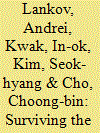| Srl | Item |
| 1 |
ID:
113943


|
|
|
|
|
| Publication |
2012.
|
| Summary/Abstract |
The "organizational life" is an important part of the daily existence of North Koreans. Every adult in North Korea has to be a participant in a multitude of rituals that serve a dual purpose of surveillance and indoctrination. In this article, we describe how the organizational life is arranged and also explain the ways it contributes to maintaining the domestic stability of North Korea and to manufacturing consent for the current regime. The study is based largely on refugee interviews.
|
|
|
|
|
|
|
|
|
|
|
|
|
|
|
|
| 2 |
ID:
119051


|
|
|
|
|
| Publication |
2013.
|
| Summary/Abstract |
The article deals with the everyday survival strategies employed by the workers of (largely non-functioning) state enterprises in post-socialist North Korea, and with the social changes this group has dealt with in the last two decades. It also compares these trends with the experiences of post-socialist Eastern Europe. In the 1990s the economic role of the North Korean state decreased dramatically. Official wages could no longer guarantee the physical survival of the populace, so workers from state industries engaged in a multitude of economic activities which were (and still are) largely related to the booming "second economy." These activities include private farming, employment in semi-legal and illegal private workshops, trade and smuggling, as well as small-scale business activities. The choice of a particular activity depends on a number of factors, of which network capital is especially significant. Income is also augmented by the illegal use of state resources and widespread theft of material and spare parts from state-owned factories. As a result of these changes, the industrial working class of North Korea, once a remarkably homogenous group, has fragmented, and its members have embarked on vastly different social trajectories.
|
|
|
|
|
|
|
|
|
|
|
|
|
|
|
|